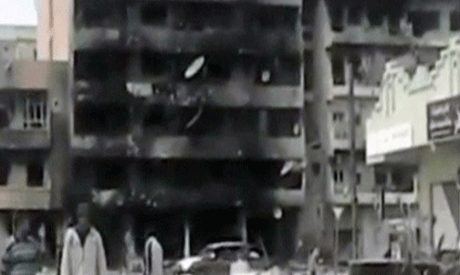
A damaged building is seen in an area purported to be in Misrata in this still image from video unloaded on April 24, (Reuters).
Muammar Gaddafi's forces attacked the key port in the besieged Libyan city of Misrata with rockets on Tuesday, wounding refugees and forcing a humanitarian ship to stay out to sea.
Several Grad rockets hit the port 12 kilometres (seven miles) east of the city and an International Organisation for Migration (IOM) ship that had come to rescue refugees stood offshore as a precaution, an AFP journalist said.
The attack came after a lull in fighting as rebels in Misrata said they pushed forces loyal to Gaddafi out of the city, although the Libyan strongman remained defiant despite NATO bombing his compound.
In Misrata, the rebels' last bastion in western Libya 215 kilometres (132 miles) from Tripoli, Doctor Khalid Abu Falra at the city's main hospital said "several refugees were wounded by the bombardment."
He added that "there may be deaths -- we have no details for the moment," as NATO warplanes overflew the rebel-held city where explosions were also heard after a 24-hour period of relative calm.
"NATO asked that the IOM boat leave the port," said a rebel source, adding that "around 20 vehicles" containing Gaddafi loyalists were approaching.
In Benghazi, the opposition Transitional National Council said the rebels still controlled Misrata despite being surrounded and bombed by Gaddafi's forces.
"The situation in Misrata remains grave. The revolutionaries are in control but they remain surrounded and bombed," TNC spokesman Jalal al-Gallal told AFP.
Misrata remains besieged by Gaddafi's troops to the east, south and west, with its only access to the outside world by sea. The airport, which has been badly damaged, is in the hands of regime forces, according to the rebels.
The port has therefore been a strategic conduit for international humanitarian aid, as well as rebel fighter reinforcements and guns and ammunition from their main eastern stronghold of Benghazi.
Rebels in the city said they had pushed Gaddafi's troops out after a siege lasting more than seven weeks, but opposition officials in Benghazi have downplayed the reports.
"There may be some soldiers hiding in the city, afraid of being killed, but there are no groups of soldiers left," one rebel in Misrata said.
The claim was greeted sceptically in Benghazi with TNC military spokesman Colonel Ahmed Omar Bani dismissing reports of progress in Misrata.
"It is a disaster there," he said. "Gaddafi is not going anywhere. Misrata is the key to Tripoli. If he lets go of Misrata, he will let go of Tripoli. He is not crazy enough to do that."
Gaddafi remains defiant despite NATO bombing his Tripoli compound and military materiel, including in his birthplace of Sirte.
"The leader is working from Tripoli. The leader is well, is very healthy, is leading the battle for peace and democracy in Libya," regime spokesman Mussa Ibrahim said outside the bombed building at Gaddafi's Bab al-Aziziya residence.
"The leader is in a safe place. He is leading a battle... he works every day. He led the battle to provide people with services, with food, medicine, fuel," Ibrahim told a news conference in the presence of several ambassadors on Monday.
A meeting room facing Gaddafi's office was badly damaged in what NATO in Brussels said was "a precision strike" on a communications centre early on Monday.
Three people were killed and 45 wounded -- 15 seriously -- in the air strike, Ibrahim said.
NATO said it struck an intelligence complex in Tripoli on Monday, one tank, three surface-to-air missile launchers, infantry fighting vehicles, a rocket launcher and a vehicle depot.
It also bombed a surface-to-air missile training facility in the vicinity of Misrata, while in Sirte it bombed three ammunition depots.
Libya's Deputy Foreign Minister Khaled Kaim says the army suspended operations against rebels in Misrata, but remained in the city, to enable local tribes to settle the battle "peacefully and not militarily."
The TNC said, however, that Gaddafi's forces had adopted the measure as a ploy to regroup.
"I am sure he is regrouping and that he will attempt to attack in greater force, but I am also sure that it will be harder than before," Gallal said.
Prime Minister Silvio Berlusconi said on Monday that Italy's air force would now take part in "targeted action" in Libya.
Russia, meanwhile, said it would not back a new UN Security Council resolution on further intervention in Libya, as Italy and France called on the international community to stop shipping oil products to Gaddafi's regime.
Foreign Minister Sergei Lavrov said Russia would not back a new Libya resolution if it calls for further foreign intervention.
But Moscow could back new UN action if it "calls for an immediate end to all violence, bloodshed, the use of force, military action, and calls on all sides to immediately sit down at the negotiating table," he added.
Protests in Libya inspired by the revolts that toppled longtime autocrats in Egypt and Tunisia escalated into war when Gaddafi's troops fired on demonstrators and protesters seized several eastern towns.
Short link: